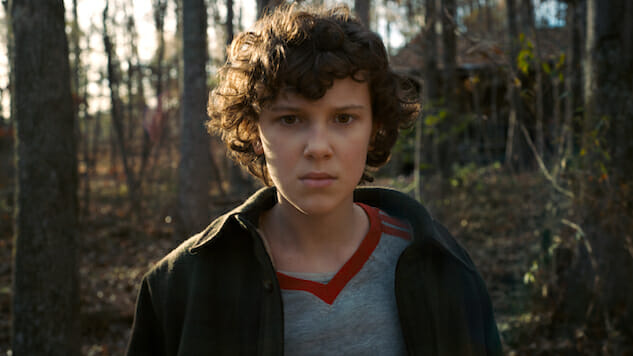Stranger Things: Possession, Pollywogs and Puberty Metaphors, Oh My!
(Episodes 2.03 and 2.04)
Photo: Courtesy of Netflix
After laying the groundwork for a cast of characters more versed in empathy than in Season One, Stranger Things immediately turns around to display the potential weaknesses of this development. In “The Pollywog” and “Will the Wise,” we’re reminded that when people care more about others, actions are more likely to follow. Potentially, very stupid actions.
These aren’t necessarily spawned from personality alterations born of physical trauma, like those found in the Phineas Gage case, which Mr. Clarke (Randall P. Havens) discusses in what must be the most eccentric middle-school science class ever. More like finding an alien amphibian and keeping it (after fighting off a demon less than a year ago) because you’ve got a crush on a girl. That’s what happens to Dustin (Gaten Matarazzo) after he investigates the trash can outside his house emitting Stomp levels of racket.
His little monster slug loves Three Musketeers bars, is christened d’Artagnan (it’s cooler than Athos, Porthos or Aramis), and—as all mysterious creatures do when fed by humans—begins growing at an alarming rate. The sci-fi time bomb continues to tick because Dustin likes Max (Sadie Sink) and girls love weird pollywogs. Right? If that plan seems bad, don’t worry. Everyone else is making poor decisions, too. An iron rod would’ve been much cleaner, but the psychological trauma affecting the squad’s choices is a pubescence that no health class slideshow could have prepared them for.
Eleven (Millie Bobby Brown) is one of the afflicted, as we learn that she’s been attempting to communicate with Mike (Finn Wolfhard) during her detainment at the cabin. The show builds up the relationship between her and Hopper (David Harbour) through a cleaning montage that shows rule-building and trust, just so we understand the depth of her disappointment in him for stowing her away with no clear end in sight. This is just another prison, and Eleven won’t be caged quietly—so she makes like a rebellious teen and goes to see her crush.
This strange escape parallels that of the nasty frog now known as Dart (because “d’Artagnan” was already a bit too highbrow for a show forcing in Mr. Mom references wherever it can) and the pair create a labyrinth of rapidfire editing in some winding school hallways. Two manhunts are simultaneously underway, both ending in decisions made out of jealousy. Eleven sees Mike talking to Max, which makes her feel forgotten and betrayed by the only non-Hopper presence in her life, and Dustin conceals his baby baddie because Lucas (Caleb McLaughlin) seems to be hitting it off more with Max. Dart, unsurprisingly yet still effectively, decides to evolve into the newest stage in its Pokémon-like transformation towards demogorgon-hood and nobody seems nearly worried enough.
Missing from these perhaps too-lighthearted shenanigans is Will (Noah Schnapp), who—following the advice of Bob (Sean Astin)—decides to turn and face his “recurring Upside Down visions” problem. “Facing your problems” turns out to be excellent advice if your problems are almost anything besides an eight-story hell-monster made of shadow tornadoes, because if you face it then, the monster possesses you in a really disturbing, nightmare-in-every-orifice way.
Possession is much cooler to deal with as a group than disappearance because, from a narrative standpoint, everything important is within reach and it becomes a puzzle to solve rather than an emptiness to fill. The puzzle pieces are clear because of the willingness of Will’s friends and family to believe him. The idea is bandied about that Will has truesight, a Dungeons and Dragons ability to see through illusions and different planes of existence. I love that D&D is the Rosetta Stone through which the party can understand why Will is an underworld punching bag. Some people need ranting talk show hosts to cope with the president, some kids need D&D to deal with sci-fi PTSD.
-

-

-

-

-

-

-

-

-

-

-

-

-

-

-

-

-

-

-

-

-

-

-

-

-

-

-

-

-

-

-

-

-

-

-

-

-

-

-

-








































